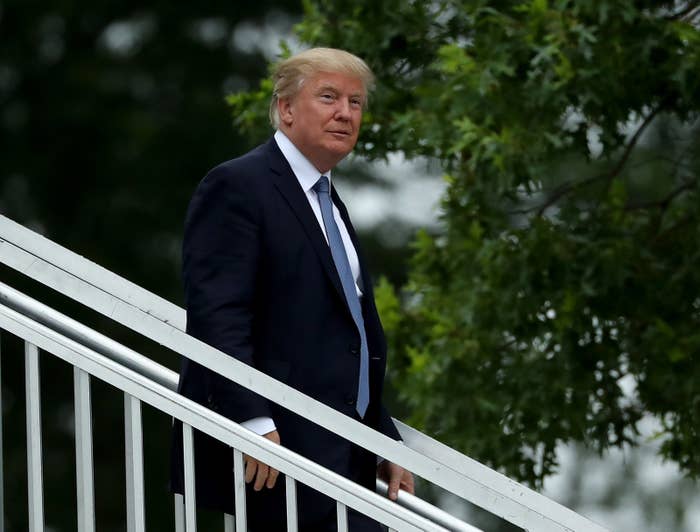
The Trump administration has again certified that Iran is in compliance with the nuclear deal forged by the Obama administration, a move that followed significant disagreements between the president and his cabinet.
US officials announced the decision on Monday and vowed to more vigorously enforce the deal in the future and impose new sanctions on Iran for its ballistic missile work and support for proxy forces across the Middle East.
"Iran is unquestionably in default of the spirit of the [deal]," a senior administration officials told reporters on a conference call Monday evening.
As they have in the past, Trump administration officials decried the international agreement, which has the broad support of Washington's key European allies, for not resolving grievances with Tehran outside the nuclear issue, such as human rights. Despite the deal's popularity, US officials suggested they could convince European countries to increase pressure on Iran.
"We're going to be working with our allies to explore options of addressing the JCPOA's flaws," the official said, using an acronym for the nuclear deal.
The Trump administration's plan to keep the deal in place nearly derailed earlier on Tuesday after the Oval Office grappled with an op-ed by former US ambassador to the UN John Bolton calling for Trump to withdraw from the deal. Such a move was reportedly opposed by Secretary of State Rex Tillerson, Secretary of Defense Jim Mattis, and National Security Adviser H.R. McMaster.
Trump, and other political aides, have been wary of their right flank when it comes to the Iran issue. The Trump administration issued tough talking points on Monday promising that it will confront Iran and its proxies throughout the Middle East.
The behind-the-scenes PR campaign demonstrates the White House's sensitivity to criticisms from right-wing hawks who believe the Trump administration should have immediately pulled out of the nuclear deal as President Donald Trump promised during the 2016 presidential campaign.
Besides issuing the talking points, the Trump administration also held an exclusive media briefing for conservative news outlets, such as National Review, in an effort to defuse potential critics.
The talking points said that the Treasury Department would impose sanctions on seven Iranian government entities and five individuals in an effort to show determination to punish Iran for what it called "malign activities" that make Iran "one of the most dangerous threats to US interests."
Those activities include continued work on developing ballistic missiles, support for terrorism and militancy, complicity with the government of President Bashar al-Assad in Syria, hostility to Israel, and cyberattacks on the US, Israel, and US allies in the Gulf, the talking points say.
The document also cites the arbitrary arrests of Americans, and accuses the Obama administration of a "myopic focus" on Iran's nuclear program that allowed the Islamic Republic to gain influence throughout the region.
The Trump administration is required by Congress to certify Iran's compliance with the nuclear deal every 90 days, a deadline that fell on Monday. Trump consistently denounced the deal as a presidential candidate, but his administration certified that Iran was complying with it when the first certification deadline passed in April.
The Trump administration told conservative outlets on Monday that it would likely certify that Iran has made good on its promise to place strict curbs on its nuclear program as mandated by the Iran nuclear deal. The administration is under pressure from key European allies to keep the deal in place, as few see any potential benefit from withdrawing from the deal and risking an Iranian effort to covertly develop a nuclear weapons program.
Here are the talking points:
Top Line Key Themes/Messages:
· Iran remains one of the most dangerous threats to US interests and to regional stability.
· The full range of Iran’s malign activities extends well beyond the nuclear threat and includes:
· Ballistic missile development and proliferation;
· Support to terrorism and militancy;
· Complicity in the Assad regime’s atrocities against the Syrian people;
· Unrelenting hostility to Israel;
· Consistently threatening freedom of navigation, especially in the strategically vital Persian Gulf;
· Cyber-attacks against the U.S., Israel, and America’s allies and partners in the Gulf;
· Grievous human rights abuses; and
· Arbitrary detention of foreigners, including U.S. citizens, on specious charges and without due process.
· These Iranian activities severely undermine the stated goal of the JCPOA nuclear deal: to contribute to “regional and international peace and security.”
· Iran is unquestionably in default of the spirit of that agreement.
· Years of concessions to the Iranian regime from the United States and others—the centerpiece of which was the JCPOA—have not caused Iran to improve its behavior.
· Indeed, the previous Administration’s myopic focus on Iran’s nuclear program to the exclusion of Iran’s many other malign activities allowed Iran’s influence in the region to reach a high-water mark.
· The previous Administration’s insistence on ignoring, excusing and downplaying the full range of Iran’s malign activities was a mistake that jeopardized American interests.
· The Trump administration will not make that mistake.
· Even as we continue to work to prevent Iran from ever obtaining a nuclear weapon, we will not look away while Iran threatens the U.S. and our allies outside the nuclear realm.
· The Trump administration’s Iran policy addresses the totality of the Iran problem.
· The actions taken today are part of a broader strategy to neutralize and counter Iran’s destabilizing influence.
· President Trump has directed his Administration to work with allies to explore options for addressing the JCPOA’s serious flaws, including:
· The JCPOA’s restrictions sunset over time, leaving Iran free to openly pursue industrial scale nuclear fuel enrichment, which is an important step in achieving nuclear weapons capability;
· The existing restrictions were inadequately enforced under the previous administration; and
· The agreement fails to address Iran’s threatening non-nuclear behavior.
· While the Trump Administration explores how to address these and other flaws in the JCPOA, we will hold Iran strictly accountable to the agreement’s requirements.
· All of these elements will be part of the comprehensive, integrated strategy that the Administration is developing to address the full spectrum of Iranian threats to our national interests.
· The Trump administration looks forward to working with Congress on this issue.
IF ASKED:
Q. President Trump has called the JCPOA the worst deal he’s ever seen. Why, then, is his Administration still adhering to its terms?
· President Trump’s views on the JCPOA have not changed.
· Under the terms of United States law, the executive branch is required periodically to provide updates to Congress, which the Administration is doing at this time.
Q: Does that mean the Trump Administration intends to remain in the JCPOA?
· The President will act in accordance with what he judges to be in the best interests of the security of the United States and our allies and partners.
· As noted, we are evaluating our Iran policy with the goal of checking the threat from Iran. That evaluation includes a thorough review of the JCPOA and America’s best interests.
Q: So you intend to withdraw from the JCPOA?
· As we have said, the President will act in accordance with what he judges to be in the best interests of the security of the United States and our allies and partners.
· A comprehensive review of United States policy toward Iran remains ongoing.
· Our goals remain the same: a non-nuclear Iran that does not threaten the United States, our allies and partners, or the region.
Q. If, as you say, the JCPOA is so bad and Iran is in “default” of its “spirit,” then why did the administration—for the second time—recertify Iran’s compliance?
· As the Secretary of State’s letter makes clear, “the JCPOA is a one-sided agreement that gives Iran every incentive to be in tactical compliance, while repeatedly testing the boundaries of the agreement.”
· This recertification in no way implies that the Trump Administration has changed its mind about the threats from Iran or the shortcomings of the JCPOA.
· We will continue to work with our allies and partners to address those threats and to address the JCPOA’s considerable flaws.
· Our goal remains a non-nuclear Iran that does not threaten the United States, our allies and partners, or the region.
Q. You cite issues beyond the nuclear realm, but the JCPOA’s terms are strictly limited to nuclear issues. Also, the agreement has no provisions for declaring Iran in “default.” Isn’t all this just a smoke screen to distract from the fact that you recertified Iranian compliance to a deal that President Trump and his political allies hate?
· The only reason the United States would support an agreement of this nature with Iran is if we see our security interests being furthered by the deal.
· While Iran may be in technical compliance, its behavior remains aggressive and threatening.
· The JCPOA was explicitly intended to contribute to “regional and international peace and security.” Iran is clearly in default of the spirit of the agreement.
Treasury Talking Points for OFAC Iran Sanctions
· Today, the U.S. Department of the Treasury, Office of Foreign Assets Control (OFAC), designated seven entities and five individuals for supporting Iran’s military or Iran’s Islamic Revolutionary Guard Corps (IGRC), as well as an Iran-based transnational criminal organization and associated persons.
· Today’s action targets three networks supporting Iran’s military or the IRGC through the development of unmanned aerial vehicles and military equipment for the IRGC, the production and maintenance of fast attack boats for the IRGC-Navy, or the procurement of electronic components for Iran’s military.
· OFAC also designated two Iranian businessmen and associated entities who orchestrated the theft of U.S. and western software programs which, at times, was sold to the Government of Iran.
· The State Department also designated today two Iranian organizations involved in Iran’s ballistic missile program.
· As a result of this action, all property and interests in property of those designated today subject to U.S. jurisdiction are blocked, and U.S. persons are generally prohibited from engaging in transactions with them.
This is a developing story. Check back for updates and follow BuzzFeed News on Twitter.


